 Petzlover
PetzloverCesky Terrier is originated from Czech Republic but Sulimov is originated from Russia. Cesky Terrier may grow 23 cm / 9 inches shorter than Sulimov. Both Cesky Terrier and Sulimov are having almost same weight. Both Cesky Terrier and Sulimov has almost same life span. Cesky Terrier may have less litter size than Sulimov. Both Cesky Terrier and Sulimov requires Moderate Maintenance.
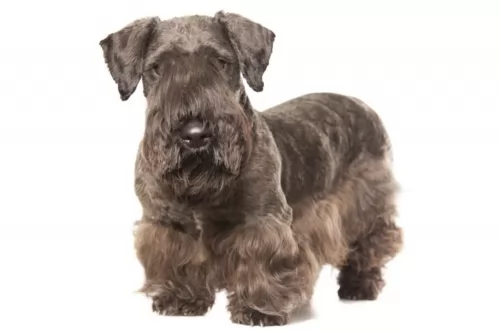 Known as the Bohemian Terrier and looking similar to a Scottish Terrier dog, the Cesky Terrier is a dog breed that has been created by Frantisek Horak, in the Czech Republic.
Known as the Bohemian Terrier and looking similar to a Scottish Terrier dog, the Cesky Terrier is a dog breed that has been created by Frantisek Horak, in the Czech Republic.
Horak wanted to breed a type of hunting dog, and in 1949, using both the Scottish Terrier ad the Sealyham Terrier, he bred the two, creating a new breed that would hopefully be a stronger hunting dog.
The Cesky Terrier was shown for the first time in 1959 and was recognized by the Federation Cynologique Internationale in 1963 and in 1993 by the United Kennel Club. It’s a rare dog this, and is the national dog of the Czech Republic.
This Russian jackal-dog-hybrid is thought to have developed from golden jackals and Lapponian Herders. In fact the dog was developed by a certain Klim Sulimov to be a robust security- and sniffer dog at Aeroflot, a Russian airline.
Jackals were used because it is believed that they have a better sense of smell than any domesticated dog there is. The Jackal can also perceive things at a distance. Later on, other dogs were also bred into the line, making it an intelligent dog with an excellent sense of smell.
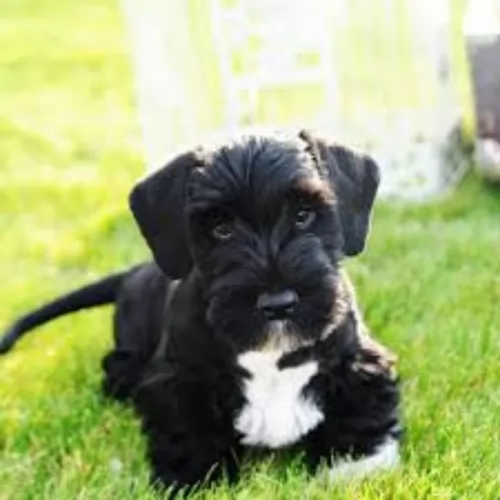 The Cesky Terrer is a longish dog, much like the Scottie and he also has short legs. He is roughly 29ck in height at the withers, is about 43cm in length and weighs anything from 5 to 10kg.
The Cesky Terrer is a longish dog, much like the Scottie and he also has short legs. He is roughly 29ck in height at the withers, is about 43cm in length and weighs anything from 5 to 10kg.
The coat of this dog is long, silky and quite wavy and can be in a number of different shades of gray or a light brown color. Puppies are born black. The soft coat can be kept groomed by clippers or you can take him to have his coat professionally trimmed.
This dog breed has natural drop ears, unlike the Scottie which has erect ears. The tail length is 18-20 cm and low set.
A loyal, quiet and loving family dog, the Cesky Terrier will get on well with children in the home and he is also friendly with other dogs. Just like with any other dog, it will be important to socialize the dog breed at an early age as then he becomes obedient, smart and relaxed. He is a breed which is also easy to train. He also makes a good watchdog.
Th Sulimov looks like, and also has characteristics of jackals and huskies. The body is large, the ears are triangular and erect, the eyes bright, alert and enquiring and the muzzle is long.
The legs of the dog are slim but strong, like the Jackal and the tail is long and bushy. The coat is fairly long, smooth and thick and can be in a range of colors such as tan, fawn, grey, white and black.
The Sulimov is a medium sized dog and stands at between 40 and 50cm in height and weighs between 12 to 15kg.
This hybrid dog is brave, confident, wily, robust, loving, affectionate and loyal. They are intelligent too and you won’t have any trouble training him.
The truth is, there isn’t much information on the personality of this breed, but they are eager to please, are full of energy and can be cheerful and feisty, even in extreme temperatures.
They’ve been bred for work and aren’t a typical family pet. Because of their wild side, they aren’t recommended for the first time dog owner or for a family pet where there are children.
If you were to keep one, it would be far better suited to life on a farm where it could have a role to play. Life in the city for this active hybrid is out of the question.
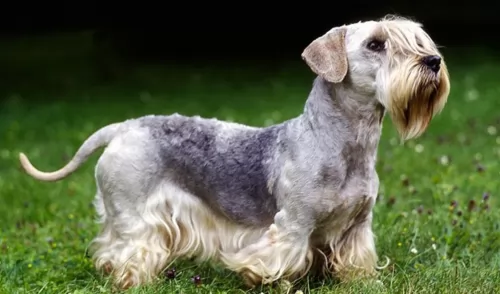 The Cesky Terrier isn’t a small-dog yapper and he will adapt to life in the city or the country. He is a small dog, but he is feisty and sporty and will willingly join you with your jogging or when you go on a walk.
The Cesky Terrier isn’t a small-dog yapper and he will adapt to life in the city or the country. He is a small dog, but he is feisty and sporty and will willingly join you with your jogging or when you go on a walk.
He is intelligent and playful and when you add in characteristics such as being courageous, loving, loyal and feisty, you can see that the Cesky Terrier is guaranteed to make a super family pet.
The Sulimov makes an excellent working dog and in fact he loves to be busy. They've got an unusual feature - their tails, which are normally curled up and over the back like a husky, hang down limply when tired. Their handler know when these dogs are ready to call it a day.
They are essentially working dogs, being loyal and devoted to their handlers, but wouldn't be considered as an ideal family pet.
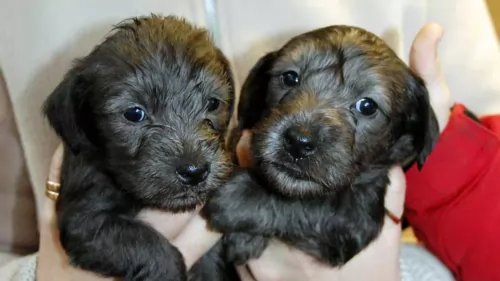 The Cesky Terrier is generally a healthy dog, but this breed sometimes suffers from common dog ailments that other breeds also have to contend with.
The Cesky Terrier is generally a healthy dog, but this breed sometimes suffers from common dog ailments that other breeds also have to contend with.
Eye disorders, ear infections, pancreatitis, hip dysplasia and weight gain are just some health issues you might need to be aware of.
Remember that if you want to promote a healthier dog, feeding him a quality diet and taking him immediately to the vet when you suspect a problem can keep him free from common dog illnesses.
Pancreatitis for instances develops when the pancreas becomes inflamed, and this can be brought on by allowing your pet to become obese. There are other reasons for pancreatitis too such as infection. You will see diarrhea, fever and vomiting with your pet as well as discomfort from abdominal pain. It’s a disease which affects smaller dogs more often than larger breeds.
There is ongoing debate about the health of hybrid dogs against that of purebred dogs. Hybrids inherit genetic dispositions that their parents would have, including certain heath issues.
Parasites are a huge cause of disease in dogs. Apart from ticks and fleas, internal parasites live inside the gastrointestinal tract and can be things like hookworms, tapewarms and roundwarms among others.
Parasites are usually transmitted when the dog ingests parasite eggs in contaminated water, food, feces or soil.
It’s important to get your dog treated as these parasites can cause weight loss, swollen abdomen, malnutrition, diarrhea, vomiting and anemia. Apart from this, they can affect people too. Fortunately these parasites are treatable and easy to prevent.
Other common dog ailments to look out for include bloat, obesity, cancer and hip dysplasia.
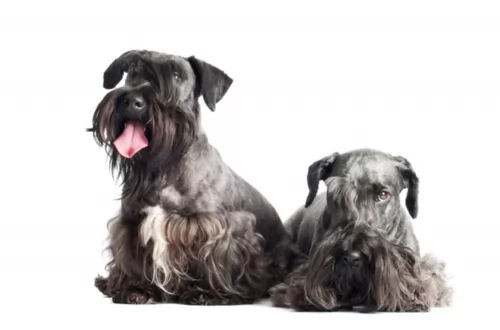 Cesky Terriers may well be a little bit less active and quieter than other terriers, but they will still need a good dose of exercise. He loves to dig, and if he is bored and doesn’t have a plenty of exercise and games, he will want to dig more and cause the owner a lot of frustration. Take him for daily walks and give him some ball games in the garden.
Cesky Terriers may well be a little bit less active and quieter than other terriers, but they will still need a good dose of exercise. He loves to dig, and if he is bored and doesn’t have a plenty of exercise and games, he will want to dig more and cause the owner a lot of frustration. Take him for daily walks and give him some ball games in the garden.
Cesky Terriers will need brushing down at least twice a week and their coats will need to be trimmed into shape every 8 to 10 weeks or so. You’ll also need to check excess hair inside the ears.
As with any dog breed, you will need to check on his nails so that they don’t grow too long and also brush his teeth 2 or 3 times a week to avoid dental disease.
This is a medium sized dog so you can buy a high quality dry kibble for him manufactured for medium sized energetic dogs.
Try and avoid the low quality dog foods which come with lots of ingredients that are plain ordinary bad for your dog, and can jeopardize his health.
Try and feed him some home-made food too – boiled chicken, brown rice or pasta and some nutritious vegetables such as spinach,sweet potatoes and carrots. Chop it all up and add some of it to the dry kibble twice a week.
You can also provide him with some raw fish and raw red meat occasionally as this keeps the skin and coat healthy. Make sure he always has fresh, cool water available.
Have him trained and socialized. As it is, for the job he does as a security dog, he is trained and socialized.
Provide him with lots of exercise – walks, ball games, exercises that stimulate mind and body.